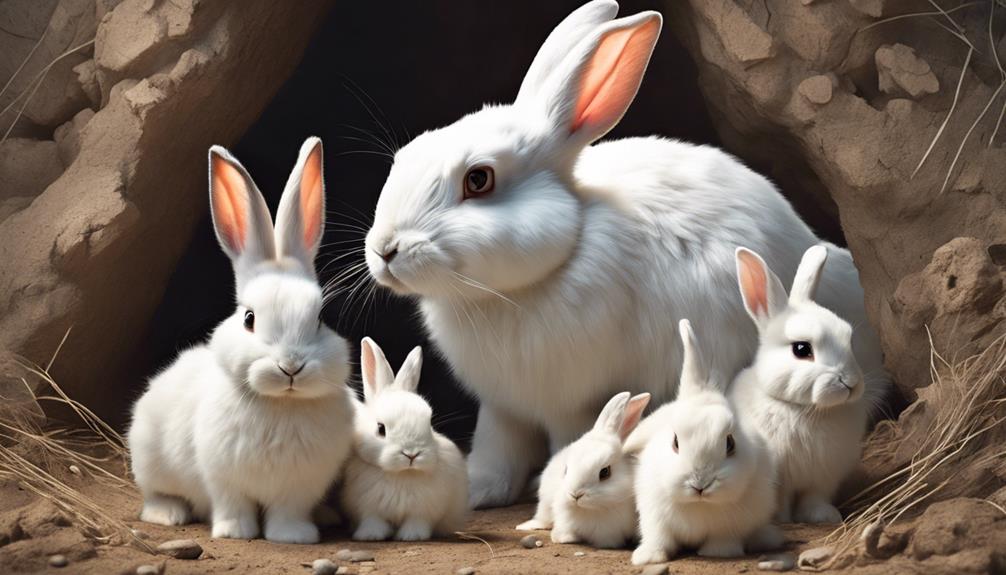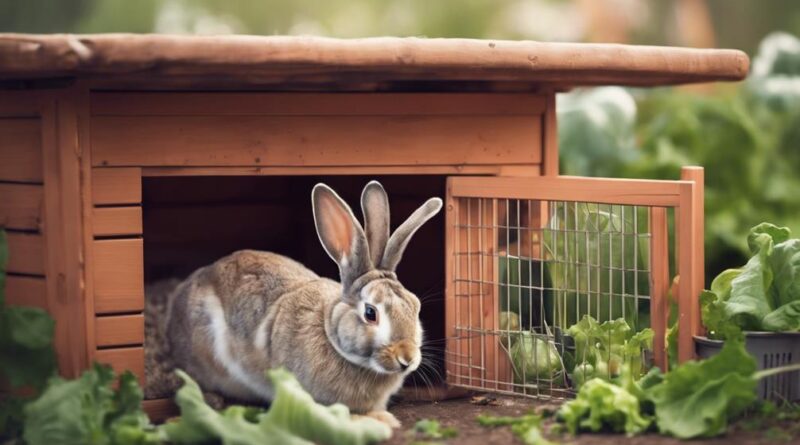Why Choose Domesticated Rabbits Over Wild Ones?
When considering rabbits as pets, choose domesticated over wild for their predictable behavior, optimal health care, and increased bonding opportunities. Domestic rabbits offer trainable manners, longevity, and controlled reproduction habits. They are easily accessible and legal, providing years of harmonious companionship. Opting for domestic breeds ensures cost-effective care and less time commitment while fostering strong connections. Each aspect contributes to a fulfilling and enriching experience with your pet. Consider these advantages as you make your choice for a loving and lasting relationship.
Behavioral Predictability
When selecting domesticated rabbits, understanding their behavioral predictability can greatly enhance your experience as a rabbit owner. Domestic rabbits are known for their predictable habits and consistent temperament, which can make them wonderful companions. These qualities make it easier for you to anticipate their needs and provide them with a comfortable environment.
Rabbits are creatures of habit, and once they establish a routine, they tend to stick to it. This predictability can be reassuring for you as an owner, as you can plan your interactions with your rabbit around their established habits. For example, if your rabbit likes to nap in a particular corner of their enclosure during the afternoon, you can avoid disturbing them during that time.
Moreover, domestic rabbits typically exhibit a consistent temperament. They're often gentle, social animals that enjoy human companionship. This makes them great pets for families or individuals looking for a loving and loyal companion. Their predictable nature allows you to build a strong bond with them over time, as you learn to understand and cater to their specific needs.
Health and Disease Control
Maintaining the health of your domestic rabbits is crucial for their well-being and longevity. To ensure your furry companions lead healthy lives, it's essential to implement preventative measures and effective disease management strategies. One of the most important steps in maintaining rabbit health is providing a balanced diet rich in hay, fresh vegetables, and limited pellets to prevent obesity and digestive issues. Regular veterinary check-ups are also vital to catch any potential health concerns early on.
Preventative measures play a significant role in keeping your rabbits healthy. This includes providing a clean living environment to prevent infections, ensuring they've access to fresh water at all times, and keeping their nails trimmed to avoid discomfort and potential injuries. Additionally, vaccination against common rabbit diseases like myxomatosis and viral hemorrhagic disease can help protect your pets from serious illnesses.
In terms of disease management, it's crucial to be vigilant for any signs of illness in your rabbits. Common symptoms to watch out for include changes in appetite, lethargy, diarrhea, or unusual discharge. If you notice any of these signs, it's essential to seek veterinary care promptly. By staying proactive and attentive to your rabbits' health needs, you can help them live long, happy, and healthy lives.
Socialization and Bonding
To foster strong bonds with your domestic rabbits, prioritize socialization efforts from an early age by creating positive interactions and environments. Playtime routines are essential for bonding with your rabbits. Set aside regular periods each day for interactive play, allowing your rabbits to explore and engage with toys. This not only provides mental stimulation but also strengthens the bond between you and your pets. Consider creating obstacle courses or hiding treats for them to find, making playtime fun and engaging.
Handling techniques play a crucial role in bonding with your domestic rabbits. Approach them calmly and confidently, speaking softly to reassure them. Start by gently petting them while offering treats to associate positive experiences with your touch. Gradually introduce them to being held, supporting their bodies securely to make them feel safe. Remember, each rabbit has its own personality, so be patient and respect their boundaries.
Bonding with your rabbits is a rewarding experience that requires time and effort. By investing in playtime routines and mastering handling techniques, you can build trust and affection with your pets. Remember, a well-socialized rabbit is a happy and content companion.
Training and Adaptability
For effective bonding and harmonious cohabitation, it's crucial to focus on the training and adaptability of your domestic rabbits. Domesticated rabbits, unlike their wild counterparts, have been selectively bred over generations to exhibit certain behaviors that make them more suitable as companions. One of the key advantages of domesticated rabbits is their behavioral predictability, which can be honed through training.
Training domestic rabbits isn't only possible but also highly beneficial. These intelligent animals can learn to respond to their names, use litter boxes, and even perform simple tricks. By investing time in training, you can enhance the bond with your rabbits and create a more enriching environment for them. Training also helps in managing their behavior, reducing the likelihood of destructive habits and promoting a harmonious living space.
Adaptability is another important aspect to consider when choosing domesticated rabbits. These animals can adjust well to various living conditions, making them suitable for both indoor and outdoor environments. With the right training and guidance, domestic rabbits can adapt to different schedules, interact with other pets, and even travel with you if needed.
Availability and Legalities
When considering domestic rabbits, it's important to understand the availability and legalities surrounding their ownership and care. Domestic rabbits are widely available through reputable breeders, rescue organizations, and shelters. Before bringing a rabbit into your home, it's crucial to research ownership regulations in your area. Some regions have specific laws regarding the ownership of rabbits, including requirements for licenses or permits. By familiarizing yourself with these regulations, you can ensure that you're compliant with local laws and provide a safe environment for your new pet.
Ethical considerations also play a significant role in the decision to choose domestic rabbits over wild ones. Domestic rabbits are bred to be companion animals, with traits that make them suitable for life in captivity. By opting for a domestic rabbit, you're supporting responsible breeding practices and helping to reduce the demand for wild rabbits as pets. Additionally, domestic rabbits are often more socialized and accustomed to human interaction, making them easier to care for and integrate into your household.
Before bringing a domestic rabbit into your home, take the time to educate yourself on ownership regulations and consider the ethical implications of your decision. By choosing a domestic rabbit, you aren't only gaining a wonderful companion but also contributing to the welfare of rabbits as a whole.
Longevity and Lifespan
The longevity and lifespan of domestic rabbits vary depending on factors such as genetics, diet, and overall care. On average, domestic rabbits can live between 8 to 12 years when provided with proper attention and a suitable environment. Ensuring your rabbit receives a balanced diet rich in hay, fresh vegetables, and a limited amount of pellets can significantly impact their lifespan. Additionally, regular veterinary check-ups, exercise, and a clean living space are crucial for maintaining their health and overall well-being.
Choosing domesticated rabbits over wild ones can offer various health benefits, including a more predictable lifespan. Domestic rabbits are less exposed to predators, diseases, and environmental hazards than their wild counterparts, which can contribute to a longer and healthier life. By providing a safe and nurturing home, you're giving your domestic rabbit the best chance at reaching their average lifespan and enjoying a fulfilling companionship with you.
Predictable Reproduction

To understand the predictable reproduction of domestic rabbits, observe their behavior and interactions within a controlled environment. Domestic rabbits have well-defined reproductive habits, making it easier to anticipate when they'll enter their mating season. Unlike wild rabbits, who may reproduce sporadically based on environmental factors, domestic rabbits tend to follow a more predictable pattern.
Mating season for domestic rabbits typically occurs throughout the year, with some minor fluctuations based on breed and individual characteristics. Female rabbits, known as does, can go into heat every few weeks, signaling their readiness to mate. During this time, they may display specific behaviors like increased vocalization, restlessness, and nesting tendencies. Male rabbits, or bucks, also exhibit noticeable changes in behavior when a doe is in heat, often becoming more attentive and eager to mate.
Overall Ease of Care
Observing the predictable reproduction patterns of domestic rabbits can provide valuable insights into their overall ease of care. Domesticated rabbits offer significant advantages over wild ones when it comes to ease of care. Here are some key points to consider:
- Cost Efficiency: Domestic rabbits are more cost-effective to care for compared to wild rabbits. They don't require specialized diets or constant veterinary attention, saving you money in the long run.
- Time Commitment: Domestic rabbits are generally easier to care for in terms of time commitment. They're accustomed to human interaction and can adapt well to routines, making it easier to feed them, clean their living space, and monitor their health.
- Predictable Behavior: Domestic rabbits exhibit more predictable behavior than their wild counterparts. This predictability makes it easier to anticipate their needs and provide appropriate care.
- Health Maintenance: Domestic rabbits are often bred with a focus on health and temperament, making them hardier and less prone to diseases than wild rabbits.
- Bonding Opportunities: Domestic rabbits are more likely to bond with their owners, which can enhance the overall experience of caring for them. This bond can also make handling and interacting with them easier and more enjoyable.
Frequently Asked Questions
Can Domesticated Rabbits Live Outdoors?
Yes, domesticated rabbits can live outdoors, but they require proper shelter, protection from predators, and suitable climate conditions. While outdoor living can provide them with space to roam and exhibit natural behaviors, many rabbit owners choose indoor companionship for better monitoring of their health and safety.
Consider your rabbit's needs and preferences when deciding between indoor and outdoor living arrangements to ensure they live a happy and healthy life.
Do Domesticated Rabbits Need Regular Grooming?
Regular grooming is essential for domesticated rabbits to keep their fur healthy and prevent matting. Brushing helps control shedding, reducing the risk of hairballs and maintaining a clean coat.
It's a bonding experience too, as your rabbit will enjoy the attention and care. By establishing a grooming routine, you can ensure your rabbit stays comfortable and happy while also promoting their overall well-being.
Are Domesticated Rabbits Prone to Escaping?
If you're wondering about domesticated rabbits, it's essential to understand their escaping tendencies.
While wild rabbits are skilled at evading predators, domestic rabbits can also be prone to escaping due to behavioral differences. Their curiosity and desire to explore can lead them to find ways out of their enclosures.
How Do Domesticated Rabbits Interact With Other Pets?
When introducing rabbits to dogs or cats, it's crucial to proceed with caution. Start by creating a safe space for the rabbit, setting boundaries for interactions, and closely supervising their initial meetings.
Slowly allow them to get used to each other's scents and presence. Positive reinforcement and patience are key in fostering good relationships between your pets.
Can Domesticated Rabbits Be Litter Trained?
Yes, domesticated rabbits can be litter trained for indoor living. With some patience and consistent behavioral training, you can teach your rabbit to use a litter box just like a cat.
This helps keep their living space clean and makes it easier to bond with your furry friend without worrying about accidents.
Providing the right environment and positive reinforcement can lead to successful litter training for your domesticated rabbit.
Conclusion
In conclusion, when choosing between domesticated and wild rabbits, consider the benefits of behavioral predictability, health control, socialization, training, availability, longevity, and predictable reproduction.
Domestic rabbits offer a more manageable and rewarding pet experience, allowing for easier care and stronger bonds. With their gentle nature and adaptability, domestic rabbits make wonderful companions for those seeking a loving and predictable relationship with their furry friends.
Choose domesticated rabbits for a fulfilling and enriching pet ownership experience.
